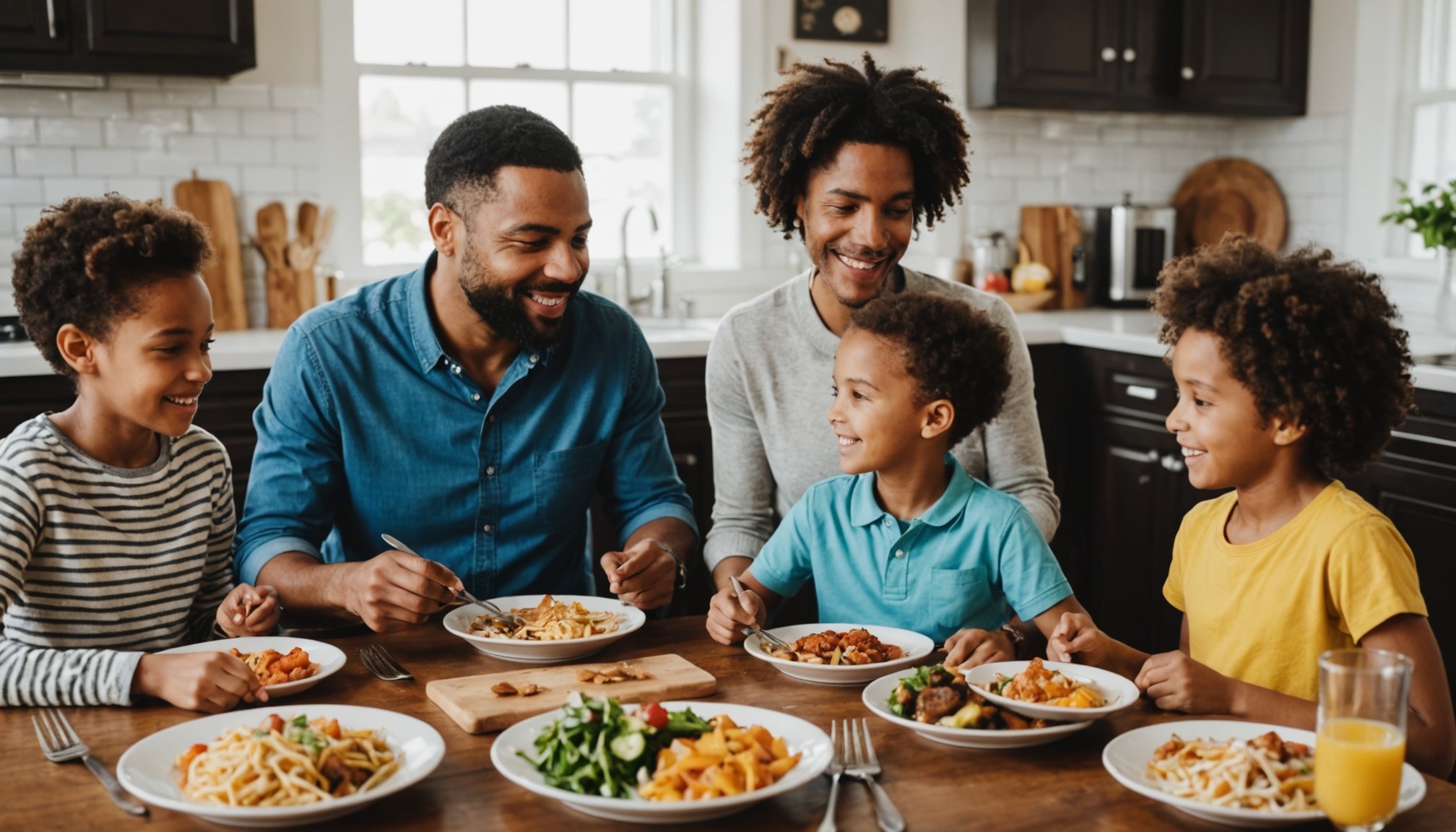Understanding the Mental Health Benefits of Family Meals
Family meals extend beyond nutritional value, positively influencing mental well-being. Research consistently underscores the mental health benefits these shared moments can bring. Studies indicate that regular family meals are associated with better psychological outcomes, such as reduced anxiety and depression. This linkage is significant because it provides a straightforward approach to enhancing emotional health.
The statistics surrounding family meals and mental wellness are compelling. According to studies, participating in family dinners at least three to four times a week is associated with a 24% decrease in the likelihood of adolescents experiencing depression and a 15% drop in their chances of developing anxiety disorders. These findings imply that the stability and routine of family meals provide a comforting environment for family members.
Also to read : Unlocking Brain Benefits: How Intermittent Fasting Enhances Mental Health
The social dynamics of family meals foster emotional support. The act of sitting down together allows family members to express themselves, share daily experiences, and offer guidance to one another, nurturing stronger emotional bonds. This emotional backing helps develop a sense of belonging and security, crucial for mental health. Prioritising family dinners can thus serve as a practical means to support mental well-being while simultaneously enriching family relationships.
Improved Communication Through Family Meals
Family meals are more than just a time to eat; they are opportunities to enhance family communication and build an emotional connection. Shared mealtime creates a relaxed environment conducive to fostering open dialogue, allowing family members to express thoughts and feelings freely. Such settings can play a crucial role in developing and strengthening emotional bonds.
In the same genre : Discover the health benefits of maqui powder today!
Improving listening skills among family members can also be a direct benefit of regular family dinners. The act of sitting together promotes attentiveness as members engage in conversations. This setting helps individuals learn to not only speak but actively listen, a skill imperative for emotional connection and understanding.
To nurture these discussions, consider using conversation starters. These can be simple yet profound topics that spark interest and interaction. Questions like “What was the best part of your day?” or “What is something new you learned this week?” encourage participants to open up and share.
By incorporating regular shared meals into family routines, there’s an opportunity to foster a nourishing environment for deeper conversations and improve overall family dynamics. Family meals can become a cornerstone for enhancing relationships and nurturing a supportive, communicative family atmosphere.
Reducing Stress and Anxiety with Family Gatherings
Family gatherings, especially mealtime rituals, serve as a vital tool for stress reduction. Sharing meals provides a structured opportunity to reinforce familial bonds, creating a familiar environment where everyone’s presence is valued. This relaxation ritual offers a safe haven from daily pressures. The simple act of gathering around a table, sharing food, and conversation emits a comforting familiarity that promotes emotional well-being.
Routine family dinners significantly impact anxiety levels. By establishing regular mealtime routines, families foster dependable predictability, which can alleviate tension and stress. Family support during these meals serves as an anchor, grounding individuals amidst life’s uncertainties. Engaging in this routine regularly cultivates a sense of belonging and security, further enhancing its calming effects.
Family meals also facilitate the development of effective coping mechanisms through shared experiences. By discussing daily events, challenges, and triumphs, family members learn from each other’s approaches to handling stress and adversity. This collective problem-solving aspect of family gatherings empowers individuals with strategies and insights instrumental in managing anxiety.
These shared experiences nurture a sense of solidarity amongst family members, reinforcing the indispensable role of family support in stress reduction. Through consistent practice, families can transform routine interactions into powerful sources of resilience.
Emotional Support Derived from Family Meals
Family meals offer more than just nutrition; they are a vessel for emotional support and family bonding. The significance of presence at the dinner table cannot be overstated. When family members gather to share a meal, it provides a unique opportunity to connect, communicate, and support each other. During these times, people often feel more open to discussing their feelings and concerns, knowing they have a supportive audience.
Meals serve as a platform for offering support during difficult times. Whether discussing challenges at work, school, or personal relationships, being surrounded by family can provide reassurance and encouragement. This exchange of support and empathy strengthens the family bond, making each member feel valued and understood.
Moreover, these shared experiences enhance resilience through collective family interactions. Facing hardships together builds a foundation of trust and security, which is crucial for developing long-term emotional resilience. Engaging in regular family meals encourages open dialogue, helping individuals to express themselves and fostering an environment of acceptance and respect.
Practical Tips for Incorporating Family Meals
Integrating regular family meals into a bustling schedule might seem daunting, but with effective meal planning and creative family time strategies, it becomes feasible and rewarding. Start by scheduling family dinners at least a few times a week. Identify a suitable time slots when everyone can gather, even if it means adjusting evening routines. Flexibility and consistency are the keys.
Quick and easy meal ideas can significantly simplify the process. Opt for dishes that require minimal preparation, such as stir-fries, one-pot meals, or tacos. These options can be prepared swiftly without compromising on health or taste.
Involving all family members in meal preparation and planning fosters engagement and shares responsibilities. Assign tasks based on age and ability—children can set the table or wash vegetables, while teens might help with cooking under supervision. This involvement not only lessens the workload but also promotes teamwork and communication in a playful and rewarding way.
Consider a weekly family meeting to discuss upcoming meals, allowing everyone to express preferences and try new recipes. This collaborative approach ensures that meals are enjoyed and anticipated by all, turning dinner into an event rather than a task.
Recipes and Meal Ideas to Encourage Family Engagement
Cooking together as a family can be a heartwarming and fun activity that strengthens bonds and fosters communication.
Simple Recipes for Busy Families
Finding family meal recipes that are both simple to make and delicious can make cooking together an enjoyable daily event. Dishes like homemade pizzas or tacos are perfect for when schedules are tight. These meals allow each family member to add their personal touch. Quick pasta dishes, salads packed with favourite toppings, or hearty stir-fries can be prepared in less than 30 minutes, making them ideal for weekday dinners.
Fun Cooking Activities for Family Members
Incorporating creative cooking activities can make meal preparations more engaging. Try making a family pizza night where everyone contributes toppings, or host a weekend pancake competition with creative shapes. These activities add excitement and allow each person to showcase their culinary creativity, providing wonderful opportunities for sharing and laughter.
Themed Dinner Nights to Enhance Engagement
Organising themed dinner nights is an effective way to promote excitement and interaction. Imagine a “Taste of Italy” night with homemade pasta and classic Italian music. Consider a “Taco Tuesday” featuring a taco bar where everyone can create their combination. Such themes can make the dining experience more enjoyable and educational, encouraging family members to learn about different cultures.











